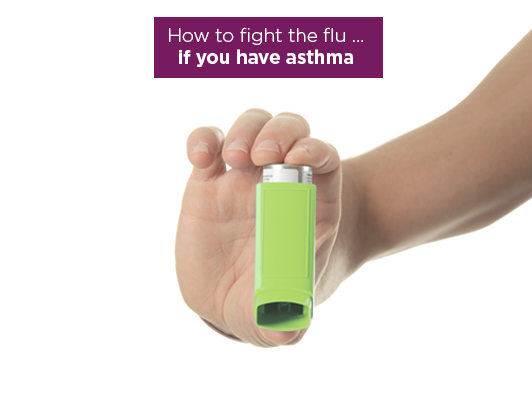Asthma and the flu
Everyone should take steps to avoid contracting or spreading the flu. But certain people should be extra careful during flu season. Are you:
- Living with diabetes?
- Living with asthma?
- Pregnant?
- An older adult?
These four populations are less likely to develop a mild illness from the flu — and more likely to suffer from serious problems. These include bronchitis, pneumonia, sinus and ear infections, hospitalizations, and more. If you are in one of the four groups, getting the flu is especially dangerous. But there are things you can do to keep yourself safe. In this blog, we’ll talk about what people with asthma can do.
Asthma and the flu
People who have asthma are no more likely to contract the flu than any other person. But if they get the flu, they are at a higher risk of developing serious illness — even if their asthma is well controlled by medication. This is because people with asthma already have sensitive airways and lungs, and developing the flu can cause further irritation and inflammation.
A flu infection can trigger asthma attacks or worsen asthma symptoms. It also can lead to pneumonia and other acute respiratory diseases. People with asthma are more likely to develop pneumonia from the flu than people who do not have asthma, and developing pneumonia can lead to hospitalization. In fact, asthma is one of the more common medical conditions among children and adults hospitalized with the flu.
If you have asthma, vaccination is the most important step in protecting yourself from the flu.
Flu shots made with inactivated flu virus are safe for people with asthma. While the safety of the nasal spray flu vaccine has not been studied in those with asthma, it is approved for use in people between 2 and 49 years old. People with asthma may be at increased risk for wheezing after getting the nasal spray flu vaccine. The nasal spray vaccine should not be used in children ages 2 to 4 who also have asthma.
In addition to getting the flu shot, there are other ways you can help prevent the spread of the flu:
- Stay home when you are sick, except to get to the doctor.
- Stay away from other people who are sick if you can.
- Cover your nose and mouth with a tissue when you cough or sneeze. If you do not have a tissue, cough or sneeze into your elbow or shoulder, not your bare hands.
- Frequently wash your hands with soap and water, especially after coughing or sneezing.
- Avoid touching your eyes, nose, or mouth.
- Regularly clean and disinfect frequently touched surfaces at home and work especially when someone is ill.
If you experience flulike symptoms and are part of a population at a high risk for developing complications, call your doctor right away to determine if any extra treatment is recommended.




